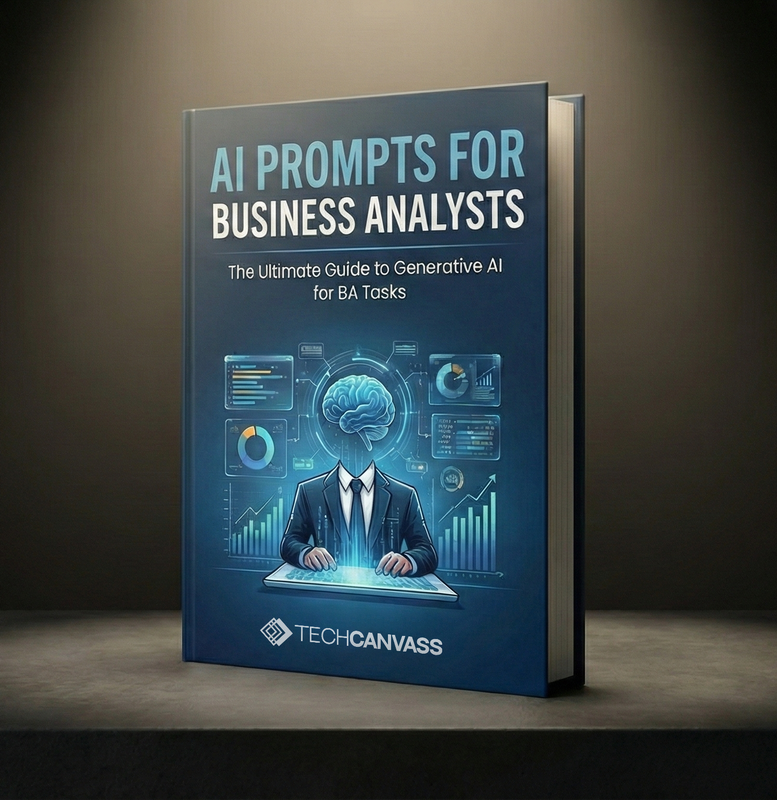Table of Contents
Overview
AI is a game-changer now, not just a trendy term. Companies are investing heavily in AI-driven solutions in the hopes of making better decisions, becoming more efficient, and gaining a competitive advantage. The catch is that AI by itself is insufficient.
The AI business analyst fills this gap by acting as a strategist, interpreter, and link between cutting-edge technology and practical business requirements. However, who is this AI-savvy expert, and why is their position more crucial than ever? Let’s get started.

Who is an AI Business Analyst?
Consider a person who is proficient in two languages: AI and commerce. An AI business analyst is what it is. They do more than merely create AI models and do math. Rather, they translate intricate AI discoveries into understandable, practical business plans. They make the necessary connections, pose pertinent queries, and guarantee that AI is a real business enabler rather than merely a flashy tool.
Useful Resources for AI Business Analysts
What Does an AI Business Analyst Do?
Consider them to be AI matchmakers, matching appropriate business challenges with appropriate AI capabilities. They play a part in more than just business analysis. They have the following effect:
Finding Opportunities in AI
Not all business issues require AI, and not all AI solutions are appropriate for the company. AI Business Analysts determine the areas in which AI can be most useful, such as supply chain optimization, process automation, or customer behavior prediction.
Understanding AI-Generated Knowledge
Although AI generates vast amounts of data, raw data is worthless on its own. AI business analysts decipher machine learning results, distinguish between noise and signals, and provide actionable insights for decision-makers.
Overcoming the Divide Between Business Teams and AI
Data scientists may create amazing AI models, but they won’t be put to good use if company executives don’t comprehend them. In order to facilitate smooth communication between tech and business teams, AI business analysts convert the complexity of AI into language that is understandable to businesses.
Promoting AI Adoption & Implementation
Making artificial intelligence (AI) functional in the real world is more important than merely developing it. To ensure success, AI business analysts train teams, monitor AI’s performance, and assist in integrating AI into business procedures.
Making Certain Ethical and Responsible AI
AI has drawbacks such as bias, transparency, and compliance; it’s not only about efficiency. AI business analysts make ensuring AI-driven choices are just, moral, and compliant with laws and corporate principles.
Skills That Make an AI Business Analyst Stand Out
You require a combination of business savvy, analytical abilities, and AI understanding to succeed in this position. What really makes an AI business analyst effective is as follows:
- Corporate Strategy Mindset: Knowing corporate objectives, industry trends, and how AI fits into the overall scheme of things.
- AI & Machine Learning Fundamentals: You don’t have to know how to code AI models, but you should be aware of their limits.
- Data Analytics Superpowers: Using SQL, AI-powered analytics platforms, and data visualization tools to glean insights.
- Innovative Problem-Solving: Finding the best AI answers for business problems rather than merely adhering to trends.
- Storytelling & Communication: Converting the intricacies of AI into clear, engaging tales that executives may use to guide their decisions.
The Impact of AI Business Analysts on Business
AI is about impact, not just technology. However, AI initiatives can fall short of expectations if the proper approach is not taken. To make AI work for them rather than against them, businesses today understand that they need analysts who are knowledgeable about AI. That final piece of the puzzle is the AI business analyst, who makes sure that investments in AI truly produce quantifiable results.
The Future is AI-Powered, But Business-Led
AI is an opportunity rather than a threat for business analysts hoping to secure their future. You will be at the forefront of this change if you can learn how to integrate AI with business strategy.
Useful Resources for AI Business Analysts
Conclusion
Are you prepared to pursue a career as an AI business analyst? Business’s future depends on those who can fully realize AI’s potential, not just on the technology itself. And you might be that person. Learn more about the crucial role of technology in modern business analysis by exploring our article on the Why Mastering AI is Important for Business Analyst?.
Frequenty Asked Questions
Q. What is an AI Business Analyst?
An AI Business Analyst is a professional who bridges the gap between business needs and AI solutions. This role focuses on identifying opportunities to apply AI technologies, managing the AI project lifecycle, and ensuring that AI-driven initiatives deliver real business value, all without requiring coding expertise.
Q. Are there AI Certifications for Business Analysts without a coding background?
Yes. The Techcanvass AI Course for Business Analysts is specifically designed for professionals with no coding experience. The course is endorsed by IIBA and focuses on applying AI tools and understanding the AI project lifecycle, making it an ideal choice for business analysts.
Q. How does becoming an AI Business Analyst benefit my career in 2025?
In 2025, businesses will increasingly seek professionals who can leverage AI to drive growth and efficiency. Becoming an AI Business Analyst future-proofs your career, making you a key player in a technology-first business environment and giving you a competitive edge in the job market.
Q. What will I learn in the AI Certification for Business Analysts course?
You will learn the basics of AI, ML, and Gen AI, and how to apply them to real-life business scenarios. The course covers the AI project lifecycle (ASDLC), hands-on practice with the latest AI tools, and mastering prompt engineering for automation and insights.
Q. Is the Techcanvass AI certification for Business Analysts recognized by the industry?
Yes, our AI Course for Business Analysts is endorsed by the International Institute of Business Analysis (IIBA), providing you with an industry-recognized credential that validates your expertise and strengthens your professional profile.
Q. Does the course include hands-on projects?
Yes, our certification is built on a practical, hands-on learning model. You will work on case studies and projects tailored for business analysts, giving you the practical experience needed to apply AI skills immediately in your professional role.
Q. Will AI replace business analysts?
No not at all, AI is going to transform the role of business analysts. AI can automate mundane tasks, amplify productivity, improve decision-making and helps to deliver better solutions for your customers.


